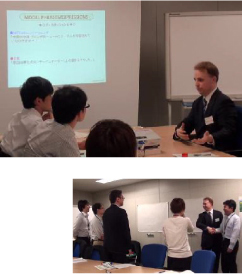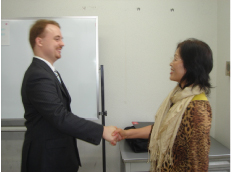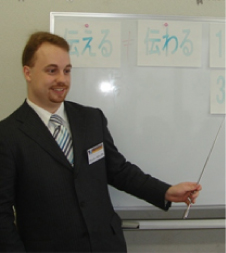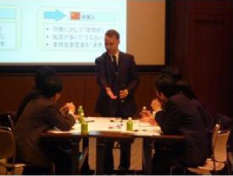Copyright Paylessimages,Inc. All Right Reserved.
- Learning the basics of intercultural communication
- Simulation of various business scenes using English
- Learning about manners and the communication style of the country you are heading for your business trip
- Practicing the management, coaching and facilitation of foreign employees
Having an understanding and awareness of not only different cultures, but also knowing about
the value orientations and communication style of one’s native culture is the very essence of intercultural competence.
When dealing with foreigners and experiencing some unpredicted reaction or misunderstanding caused by a cultural difference, the ability to talk about this difference leads to the “sharing“ of the cultural traits involved. Therefore, the mental stress, uncertainty and anxiety caused by cultural differences can be reduced, since both parties know now about each other’s “cultural specialty”.
Even when it is not really possible to understand each other, through sharing cultural differences the behavioral patterns of the persons involved will become visible, which makes an ongoing communication and relationship much easier. True mutual understanding is not the condition for intercultural communication, but the outcome of an ongoing relationship by continuing to share cultural differences whenever such might arise in daily interaction.

This seminar program aims at learning basics and specific skills of intercultural communication. It is designed for freshmen and employees that will have to deal with international business matters in the near future. Furthermore, this program can be deployed into your English education classes. While using English in various role-plays and simulations, the participants will be able to develop their "intercultural competence" parallel to their Business English communication skills. Therefore, the essential skills for global business can be covered without spending extra money for too many classes.
※Depending on your needs and the available time, "study-points" can be customized and arranged freely.
| Basics | Advanced | Practice (Simulation) | English Training |
|---|---|---|---|
| Basics of interpersonal communication | Cultural dimensions (cultural value orientations; basic models and their employment) |
DIE-Method (An EQ-skill for preventing cultural based misunderstandings and emotional overreactions) |
Greeting & Self-Introduction (Learn the basics for making a good impression when meeting for the first time) |
| The concept of "culture" | High & Low Context Communication styles | FACE Intercultural Coaching Model (A communication skill for sharing cultural differences and creating better relationships) |
Discussion (How to state your point, formulate disagreement and find the right timing to speak up) |
| Intercultural sensitivity | Nonverbal communication in an intercultural setting | Simulation: "The international conference" (A role-play for experiencing intercultural communication and learning how to deal with cultural differences) |
Logic (Learn about the basics of logical thinking and train how to present your ideas in an easy to understand way) |
| Intercultural competence | The concept of "Time" in an intercultural setting | Meeting for the first time (Learn the basics of a correct handshake and introducing yourself) |
Rhetoric & Negotiation (Learn how to move your interlocutor’s heart and head) |
| The dangers of intercultural communication | The dangers of intercultural communication (a comparative study and analysis) |
Epoche (The skill of confirming and empathizing) |
Presentation (The basics of a powerful presentation for an international audience) |
| Intercultural conflicts and misunderstandings | Intercultural Coaching | Managing a multi-national team (Case-Study: Resolving cultural conflicts) |
Feedback (Learn how to give effective feedback to foreigners) |
| Stereotyping and the under-estimation of culture | Explanation of Culture and the sharing of cultural differences | Explanation of Culture (Explaining Japanese culture to foreigners) |
Networking (Small talk and socializing in English) |
 1 day / 6 hours
1 day / 6 hours
| [Basics] | Intercultural conflicts and misunderstandings, Intercultural competence, Stereotyping and the under-estimation of culture |
|---|---|
| [Advanced] | Nonverbal communication in an intercultural setting High & Low Context Communication styles, The concept of "Time" in an intercultural setting |
| [Practice] | Simulation: "The international conference" (A role-play for experiencing intercultural communication and learning how to deal with cultural differences) DIE-Method (An EQ-skill for preventing cultural based misunderstandings and emotional overreactions) Epoche (The skill of confirming and empathizing) Managing a multi-national team (Case-Study: Resolving cultural conflicts) |
| [English Training] | Experiencing intercultural communication (role-play, presentation, discussion) |

I could learn a lot, especially how to teach intercultural communication, although I have already known theories and other knowledge on IC to some extent and then working as an IC trainer for undergraduate students in Japan.
I could think and learn about the concept of culture and intercultural communication. As a first step, we need do know and recognize cultural differences. Then we need to accept those and try to utilize these differences for our communication. This is surely not a skill limited for intercultural communication, but can be used also for ordinary interpersonal communication, too.
It was a hands-on workshop with many insides. Thank you very much.
Thank you very much for today’s seminar. It was the second time I joined your seminars and again, I enjoyed the activities and workshop.
I could engage in great interactions with the other participants, which proofed to be a valuable experience.
I don’t take part in seminars very often, but usually when a Japanese facilitator is holding a seminar, the main part will be a long lecture with the standard pattern of “do you have questions?” at the end. Therefore, most of the times I attended such seminars it was very boring, I got sleepy and did not really remember much of the contents.
In your seminar we talked about the bio-reaction of “fighting”-“fleeing” or “playing dead”, which applies quite well to nowadays economic environment. That is why today’s seminar is in my opinion not only useful for intercultural communication, but also for many situations we have to face in our daily life.
In the good old times there was mutual help and support, but nowadays, people are occupied with themselves and unable to care much about others. In some cases, they even lose control of themselves.
Thanks to today’s seminar, I got the chance to review myself and think about a lot of things. Today’s intercultural communication seminar gave me many important hints. Thanks for that.
The topic of today’s seminar was “intercultural communication“, but it felt that the seminar itself was actual and living interculture. It was not only academic, but action and practice. The balance of theory and practice was great and the contents of the seminar are applicable for daily life and business
Intercultural trainings are tailor-made in order to help or prepare you for managing multi-national employees, handling overseas business trips or international negotiations.The contents and applied methods for the training will be chosen according to your needs and the expected results.
 |
Hearing and confirmation of the tasks or problems you are facing and what kind of goals you wish to achieve with the training. |
|---|---|
 |
According to your needs a training program will be designed and presented. Furthermore, we will agree when and how to measure the results/outcome of the training and agree on a follow up program (i.e. personal coaching and additional training units). |
 |
Start of the training program. |
 |
Measurement of the results, feedback or - if necessary – starting the follow up sessions (coaching or additional training units). |
 |
Engineers deployed only for the domestic business will be sent frequently overseas in the near future. Furthermore, most of the participants are not used to speak English and have no experiences in dealing with foreigners. | ||||||||||||
|---|---|---|---|---|---|---|---|---|---|---|---|---|---|
 |
Even if the engineers’ English proficiency is not very high, NTT-Communications’ goal was to make them confident in using their vocabulary and professional knowledge to make themselves understood and therefore being able to manage overseas business trips. |  |
|||||||||||
 |
1 day / 8 hours; Simulation of a business trip to London (Analysis of a network trouble)
|
||||||||||||
|
|||||||||||||
※All comments were provided by NTT-Communications
- After the training, I feel more at ease when using English
- I understood that not only English, but also intercultural matters are important
- This training helped me to assess my own level clearly and was a good opportunity for further improvements
- It was the first time I learned that depending on the country, the handshake-styles are different
- No one ever taught me the importance of a correct handshake, which was very easy to understand and to practice in this training
- Because it was made clear that this training is not an English lesson, I could use a lot’s of English freely
- It became clear that more important than a perfect English is the ability to make yourself understood
- Because we were not given much preparation time for the role-plays, it felt really realistic
- I understood that English is a tool, rather than a „must-study“ thing
- Even having a good understanding of English grammar, under pressure, I experienced that this knowledge cannot be used at all
- I could really feel the difficulties of intercultural communication
- I realized the importance of being aware of my own Japanese culture

- Even with a low English proficiency, by making things short and simple, I can make myself understood
- When doing business abroad, I need to focus not only on language, but also on cultural matters
- By focusing on the actual contents I want to say rather than thinking about the grammar, I will be able to speak English, although my language proficiency is not very high
- The lecture was based on the trainer’s own experience, which made it very easy to follow
- What the trainer said was really interesting, which made this training a satisfying experience
- The trainer’s Japanese proficiency is very high, which made the lectures easy to understand. Furthermore, his teaching and facilitation style increased our self-confidence a lot
- The trainer always looked for the positive aspects of our performance, even when our English was really bad and he created an atmosphere, were we could feel at ease without being embarrassed

Obviously, the main purpose of an English lesson is to learn and practice English, so the focus will be on grammar, vocabulary and pronunciation. Whereas, intercultural training aims on the ability to communicate “smoothly” with foreigners (people having a different set of values). However, in most cases the common language of intercultural business is (still) English, so training intercultural communication using English is an effective way to polish up two necessary skills for global business.
Anyway, instead of trying to speak like a native, it is much more realistic to think of language as one tool to make yourself being understood. As other tools, you can use gestures, prints, figures slides and of course intercultural skills (correct manners and sound strategies for your communication according to the cultures involved).
English lessons will aim on perfect (or sufficient) English, while intercultural training will focus on the ability to perform effective and appropriate communication in an intercultural setting.
In general the language will be Japanese or English; however, this depends on your needs and the proficiency of the participants.
For example, lectures and explanations can be held in Japanese, while for group works or role-plays English will be used. Materials can be also provided in Japanese and/or English.
For lectures and activities held completely in English, a TOEIC score of about 600 or more is necessary.
However, it is also possible to design special classes or trainings for participants with a TOEIC score of 300, under 500, under 600 or advanced classes with a score of more than 600 or 800.
All our seminars and trainings will be facilitated by our company’s president Matthias Kaemper.
He can fluently speak English, Japanese and German, is married to a Korean and works also as an intercultural trainer and consultant in South Korea. (You will find more details under Kaemper’s profile at the end of this site.)
Our training programs are all founded not only on academic theory, but also on the daily life’s experience of Matthias Kaemper. Without relying on the backup of a strong big company, he made his way as an unknown individual in Japan (as a student, business person and entrepreneur) and therefore learned his lessons the hard way.
All this living experiences (global business and international marriage) that are being put to practice every day ensure that what we will talk about in the seminars is all „reality“, not some nice looking theory or idealistic, unrealistic dream of how international business should be.
Many of our programs will differ significantly from what is written in the books, but if you wish to train your employees in skills that really bring results, than what you need is a trainer who has gone (and still goes) along the hard way of practical learned and used intercultural communication.
If you consider intercultural training as an English lesson, then a native facilitator would indeed be the best choice. However, even when English is the lingua franca for global business, the chance that you will encounter a native English speaker is not very high: Two out of three business people are said to be non-natives, so global people need also to understand different English dialects, incorrect pronunciations and other mistakes.
This means that even if you have studied under an American teacher, there won’t be a guarantee that you will be able to understand the English spoken by a Korean or Chinese business partner.
In times of globalization it is necessary to be able to cope with different Englishes as an international language, instead of clinging to a perfect British or American English.
Furthermore, besides linguistic matters, cultural factors will also influence your business dramatically. Therefore, a trainer from multi-cultural Europe who has also business experience in Asia should be far more able to teach intercultural skills than maybe an American, who still sees his own culture as a kind of global standard.
Anyway, to learn intercultural communication and English from a Japanese speaking German…this is no artificial learning environment, but living intercultural communication!
Yes, of course! Indeed you can say that intercultural knowledge and skill development should be part of every freshman’s training and education.
Globalization will continue, so for the young employees that hold the future of your business in their hands, intercultural competence will become one of the most important assets to survive and succeed on a global market.
Besides lectures, intercultural seminars and trainings will mainly contain activity based workshops, discussions, simulations (role-plays) and case studies, so all programs will generally be hands-on.
According to your needs and wishes, the most effective style and exercises will be implemented into your tailor-made training.
Our trainer’s (Matthias Kaemper) broad intercultural experience as a former NATO soldier who served in Kosovo, as an overseas student in Japan, as a translator working in a multi-national team and as an intercultural trainer in Japan and Korea is fully utilized for all our programs.
Furthermore, he studied under renowned intercultural experts and engaged in academic research covering the topic of intercultural competence.
Academic theory and actual experience are forming the core of our training concepts, therefore we will not teach about nice looking but vague concepts like “mutual understanding“ or “open mindedness“, but focus on real skills that can be used for global business by “ordinary” people.
Different from many other experts and trainers, Matthias Kaemper developed his intercultural skills the very hard way as an individual without much support, power or money. All the skills Kaemper will train are actually being put to use every day in his private and business life, which is the reason why our programs provide true results. His experience and academic background are the keys of our success and surely cannot be copied by pure theorists.
For seminars containing mostly activities and role-plays, 10 to 30 participants will be the range for an effective training.
Programs with mostly lectures and discussions can also be held for 30 and more participants.
Yes, we can have a meeting for free without having the need to sign a contract or any other obligations.
Just contact us under info@ibunka-coaching.com.
In Tokyo, Yokohama and the close prefectures a meeting can be arranged easily. For other prefectures or countries abroad, meetings can be set up via phone or Skype.
After the hearing, we suggest a concept for a training or seminar; however, there is no obligation to actually order it.
・1 day, 8 hours, 20 participants, mainly role-plays:
→ 150.000 Jap. Yen
・1 day, 4 hours, 50 participants, mainly lectures/group works and discussions:
→ 100.000 Jap. Yen
The actual fees for a training/seminar depend on following factors:
The number of trainings/seminars, The length of each training/seminar, The number of participants, Materials used for the training/seminar
Trying to understand others is very important. However, to truly understand another being is (realistically spoken) a task hardly achievable. Furthermore, to gain sufficient knowledge about all the cultures of the world is obviously impossible.
Therefore we advice that mutual understanding should not be considered as the condition for successful communication, but instead, whenever you feel that something is “strange” when dealing with foreigners, try to communicate clearly what you felt, how you interpreted the happening and what your cultural values and exceptions in such a situation are. Ask also for feedback and information, so that cultural differences can be shared and therefore intercultural communication will lose its “unpredictability”.
Instead of trying to kill yourself in order to adapt 100% to your interlocutor, give others also the chance to understand and empathize with you by providing them with information about YOUR culture and point of view. This will make a smooth intercultural communication possible and therefore will lead to a true understanding as an outcome of continued interaction.
Matthias Kaemper
IC Coaching (Inc.) President
Intercultural Trainer & Certified Business Coach
| 1979 | Born in Bamberg (Bavaria, Germany) |
|---|---|
| 2000 | German Army, Division Special Operations (DSO) Airborne, Duty in Prizren (Kosovo), NATO KFOR Peace-Keeping-Operation |
| 2002 | Japan |
| ■ Business | PFU Limited (Fujitsu) [8 years] (Software & Firmware Development; German-English-Japanese Translations) IC Coaching (Inc.) [Founded 2007] (Intercultural Training, Business Coaching, Corporate Seminars) |
|---|---|
| ■ Academic | Obirin University 2007 (Japan) (BA, Linguistics and Communication Studies) Rikkyo University; Graduate School 2010 (Japan) (MA, Intercultural Communication Studies) |
| ■ Specialization | Intercultural Competence Development Global Business Communication & Facilitation |
| ■ Certifications | Certified Business Coach (生涯学習開発財団認定コーチ) TOEIC Score: 950 Japanese Proficiency Test: Level 1 |
| ■ Resources | SIETAR Japan (Society for Intercultural Education, Training and Research) RICS (Rikkyo University Intercultural Communication Society) Rotary Japan, Tokyo (Rotary Yoneyama Memorial Research Fellowship) |
| ■ Experiences | The Japan Times Academy (Japan, Tokyo) NTT-Communications (Japan, Tokyo) NEC (Japan, Tokyo) Alue Corporation (Japan, Tokyo) Asahi Culture Center (Japan, Tokyo) ZEST Corporation (Japan, Yokohama) Business Coaching & Consultation (IC Coaching Inc.) |
South Korea Gyeonggi-Do Goyang-Shi
Gangsong-Ro 153 311-1303












